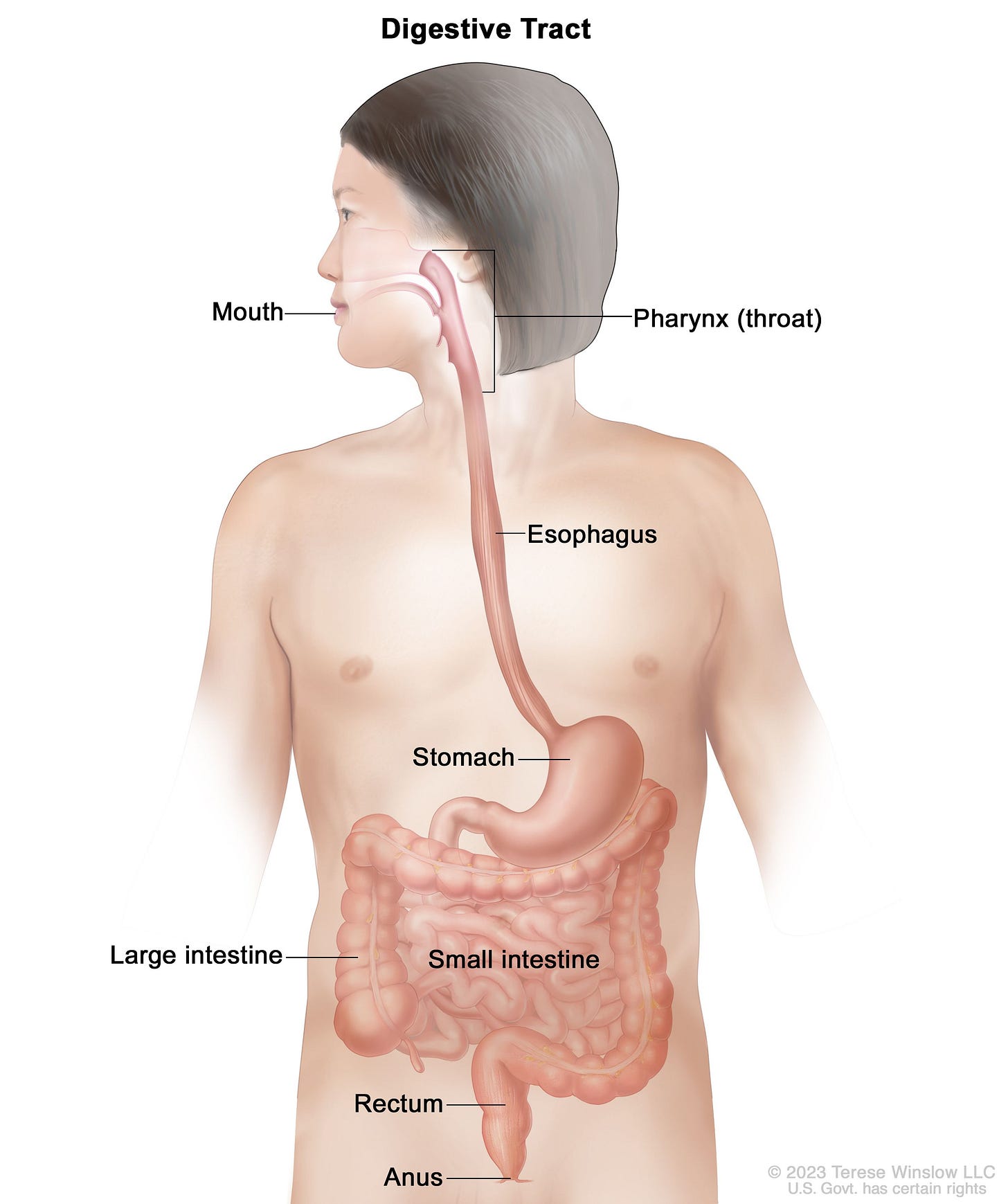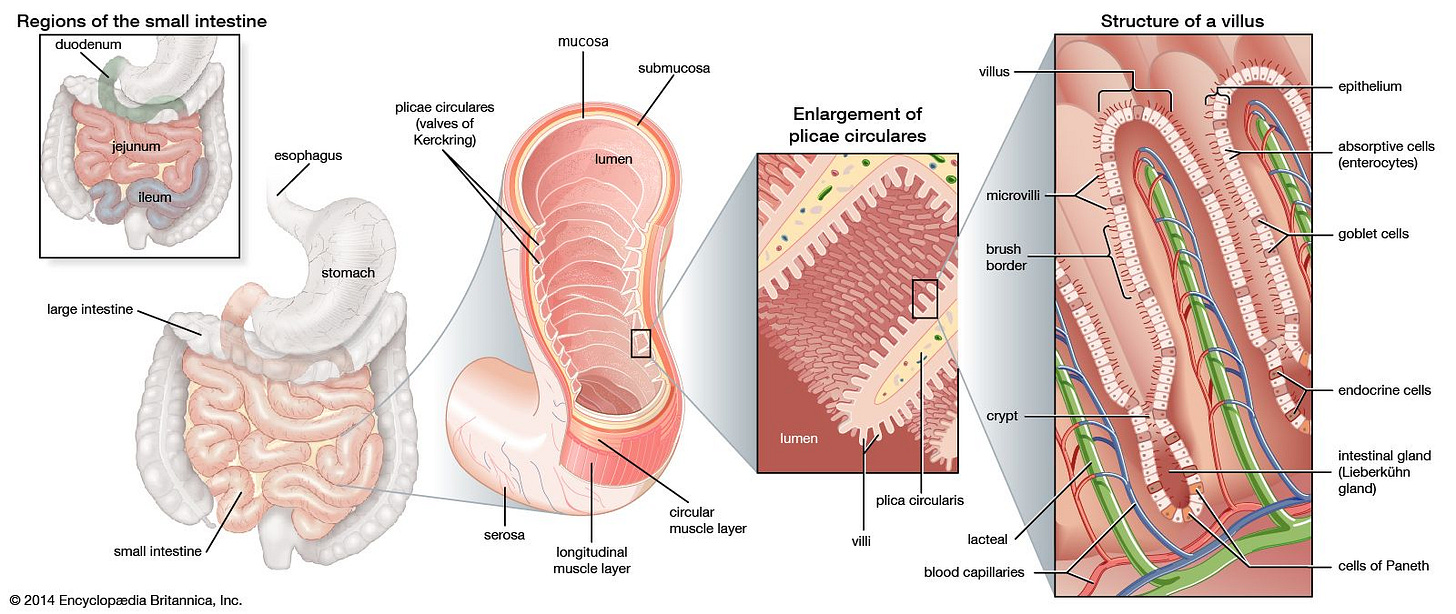Leaky gut syndrome: the false belief that a leaky gut is the source of all ailments
Misinformation about intestinal function has been exploited by the wellness industry
Leaky gut, sometimes called increased intestinal permeability, is a unsubstantiated medical condition propagated by the wellness industry.
The term is used to describe a scenario where bacteria and toxins supposedly "leak" through the intestinal wall. It has become a popular diagnosis among alternative health practitioners, who link it to a wide range of symptoms like bloating, gas, cramps, food sensitivities, and various aches and pains.
Leaky gut is an prime example of the wellness industry’s predatory strategy:
Scare you into believing you have a health problem.
Tell you they have the solution that modern medicine doesn’t want you to hear.
Sell you “diagnostic tests” and “treatments” and make a lot of money.
To be clear: Leaky gut syndrome is not recognized as a valid medical diagnosis.
As with nearly all pseudoscience claims, leaky gut syndrome uses a grain of truth and wildly exaggerates it. In this instance, the pathology of certain gastrointestinal diseases such as Crohn’s and Celiac disease lead to changes in your GI tract that impact permeability of intestinal cells. These changes are a symptom of those diseases - a result of the pathology - not a cause. It’s also important to remember that the etiology of even just those two diseases are quite different - something that people who make broad claims about large buckets of diseases don’t quite understand (my cancer basics piece discusses that same phenomenon).
Of course, the wellness industry has extrapolated that to claim that intestinal permeability is not a symptom of specific GI diseases but an actual disease condition itself. They state that impairment in the intestinal cells allows toxins and undigested food into your bloodstream, which trigger inflammatory responses that cause an array of other medical issues.
Proponents of leaky gut syndrome claim that all of these symptoms are due to this unsubstantiated condition:
Chronic diarrhea
Constipation
Gas
Bloating
Nutritional deficiencies
Immunodeficiency
Headaches
Memory loss
Fatigue
Skin problems like acne or eczema
Cravings for sugar or carbs
Joint pain
Mood disorders
Autoimmune diseases
Allergies
Autism
Yikes. If you listened to these folks, you’d think every symptom you experience is because of "leaky gut”. The wellness industry conflates symptoms of legitimate gastrointestinal disorders, like Crohn’s and Celiac with this unsubstantiated condition. Remember: using grains of truth is a well-documented strategy by those who promote pseudoscience, as it gives their claims an appearance of credibility.
Your intestines are selectively permeable by design, otherwise you wouldn’t be able to digest food.
The gastrointestinal (GI) tract, covering about 4000 square feet of surface area, begins with the mouth, where mechanical activity and enzymatic digestion begin. Food then travels down the esophagus into the stomach where food is further broken down by stomach acid and enzymes.
The processed food then moves into the small intestine, a 20-foot-long and 1-inch-diameter organ, where it mixes with digestive enzymes and beneficial microorganisms to extract nutrients and water which are absorbed into the bloodstream. What remains, including waste and sloughed off cells (human and microbial) from the GI tract, eventually moves into the large intestine or colon to be turned into stool over the course of 30-40 hours and is excreted through the anus. This process is incredibly complex and tightly regulated, especially in the small intestine.

Herein lies the pseudoscience of leaky gut.
Leaky gut is the victim of a common theme in pseudoscience, where something that has a real meaning in the realm of science is taken and distorted. In this case, this refers to the concept of permeability in the intestine. The small intestine comprises four layers: mucosa, submucosa, muscular layer, and adventitia. The mucosa, lined with epithelial cells, secretes mucus for protection and nutrient absorption.
The structure of the small intestine, including the villi and microvilli, increases its surface area for efficient nutrient absorption. The epithelial cells that line the villi are connected by protein structures: desmosomes, adherens junctions, and tight junctions. These provide structure while allowing selective passage of water and nutrients into the bloodstream and simultaneously blocking the escape of harmful substances and waste materials.
Yes, all of these individual intestinal cells change their permeability, which allows them to move, respond dynamically to changes in the environment, allow nutrients, fluids, and immune cells to be transported across the intestinal wall, and more. This is an important and integral feature of our gastrointestinal tract. If things couldn’t move into and out of the intestinal compartment, our body wouldn’t function. But this architecture and function of the intestine is complex and tightly regulated.

The problem? This legitimate concept has been manipulated to suggest that the intestines become ‘overly’ permeable and allow undigested food, toxins, and pathogens to enter the bloodstream. This is false.
Proponents of 'leaky gut syndrome' argue that the tight junctions become loose, leading to undigested food, bacteria, and toxins entering the bloodstream, causing inflammation and triggering immune reactions. This is not supported by credible and robust scientific evidence.
Physicians sometimes observe increased intestinal permeability in people who have Crohn’s disease, celiac disease, in individuals receiving chemotherapy, and those who have a high intake of bowel-damaging substances such as aspirin and alcohol.
However, intestinal permeability is a symptom of these ailments, not a cause; it does not lead to anything more than inflammation of the bowel walls, and it is not leaky gut syndrome. Furthermore, research shows that increased intestinal permeability sometimes has beneficial effects, such as improving water and nutrient absorption as well as activating and educating the immune system. It isn’t a this or that situation, but for those that don’t have an understanding of physiology, they oversimplify science for profit.
Proponents of leaky gut make a lot of money selling fraudulent tests.
There are a myriad of tests advertised by non-reputable practitioners and influencers claiming to diagnose ‘leaky gut’:
The Mannitol/Lactulose urine test.
This involves ingesting two sugars, mannitol and lactulose. Mannitol is readily absorbed by normally-functioning GI tracts, whereas lactulose is not. Proponents use the login that if both are found in high levels in urine, it means someone has 'leaky gut.' The problem is that there is no evidence that this test, or the results, are reliable. Mannitol and lactulose levels can be influenced by countless factors, including individual metabolism and kidney function. This test is also not standardized and as such, is not endorsed by credible medical organizations and professionals.
Using this test to diagnose leaky gut syndrome would be like ordering a test to look for blood in the stool of someone with IBD and using a positive test result to ‘prove’ that the bloody stools caused some other mysterious disease that in turn caused the IBD. We already know that bloody stools are a symptom of Crohn’s disease or ulcerative colitis, just as we know that intestinal permeability is a symptom of some diseases such as Crohn’s disease and celiac disease. It does not mean that the intestinal permeability ITSELF is a disease.
There are no data that demonstrate intestinal permeability itself causes disease; be wary of anyone who claims that it does.
Serum LPS levels as a measure of intestinal permeability.
Lipopolysaccharide (LPS) is a component of certain bacterial cell walls. LPS is a molecule that is a potent activator of our immune system through toll-like receptor 4 (TLR4), which is expressed on innate immune cells like macrophages and dendritic cells. We routinely use it as a positive control in cell culture immunology studies for this reason. The logic by ‘leaky gut’ proponents is that measuring LPS in blood circulation would detect if undesirable bacterial components are “leaking” through the intestinal cell wall.
The issues:
LPS is virtually everywhere, including on every surface, because it is a major cellular component of nearly all gram-negative bacteria. Klebsiella, Acinetobacter, Pseudomonas, Escherichia coli, Neisseria, Enterobacter, etc. are all common gram-negative bacteria. Because these bacteria are everywhere, LPS from surfaces and sample processing undoubtedly contaminate these types of tests, unless specifically processed and labeled “endotoxin free” (which is not happening by folks recommending these tests).
LPS levels that would be present in the blood of someone with a ‘leaky gut’ would be extremely low, probably below the level of detection
If LPS were detected, you cannot exclude the likelihood that contamination occurred from LPS that is ubiquitous, which confounds the results.
If someone did have measurably high LPS levels in their blood, that would be an indication of potential serious infection such as sepsis, not leaky gut.
As a result, this is not a reliable nor clinically recommended method to assess for anything, certainly not leaky gut.
Zonulin test.
Zonulin is a protein involved in regulating tight junctions in the gut. Some tests measure zonulin levels in blood or stool as an indicator of intestinal permeability. However, the methods and kits used for assessing zonulin are often not specific enough for a definitive diagnosis, and elevated zonulin levels can be associated with a variety of other conditions and even some common medications.
Microbiome tests.
Some practitioners use tests that claim to assess the balance of gut microbiota to diagnose 'leaky gut.' However, the relationship between microbial composition and intestinal permeability is complex and not fully understood. More than that, there is no definition of what a ‘normal’ microbiome is, everyone has a unique population of trillions of living microbes that themselves are responding and changing to their environment. Shifts in microbiota populations happen all the time: different species preferentially feed on different food sources in your GI tract, so looking at a change does not mean the change is harmful. In addition, there is zero standardization and clinical validation of microbiome tests, and they should not be used for any sort of diagnostic procedure. They all only look at a sampling of specific bacteria species, some isolate DNA, some isolate RNA; none are approved by regulatory agencies. I spoke with Inverse previously to discuss many of the issues with microbiome tests here.
Other unvalidated tests including food sensitivity tests and ‘inflammation’ markers.
Some practitioners claim that identifying food sensitivities through various tests can indicate a 'leaky gut.' However, these IgG food antibody tests lack scientific validation and are not recognized by credible medical organizations. These tests merely measure a potential exposure to a substance, which is what IgG antibody levels denote. They aren’t diagnosing a food sensitivity, much less leaky gut.
Tests that claim to measure immune responses or inflammation as a direct result of 'leaky gut' might also be recommended. These tests can be misleading as they are not directly or specifically related to anything regarding intestinal permeability, merely chemicals that are produced by cells in our body
Tests marketed for diagnosing 'leaky gut syndrome' are based on unproven theories and lack scientific credibility. Their results can be misleading, leading to incorrect diagnoses and inappropriate treatments. It's important for individuals to seek advice from qualified healthcare professionals and rely on scientifically validated diagnostic methods.
Purported treatments for “leaky gut” range from ineffective to potentially harmful.
Many “treatments” circulate around fad diets, claiming that normal foods cause serious problems in most people. A common fad is Candida overgrowth: claims that eating sugar (including fruit) leads to overgrowth of yeast that causes “leaky gut”. Other people claim eliminating other dietary components like dairy, gluten, or other foods will cure you (read my piece on gluten here).
Aside from legitimate intolerances or allergies (lactose intolerance or celiac) there are no data to suggest people need to avoid these foods or that they lead to Candida overgrowth. There are obvious harms with restrictive diets such as malnutrition, but also psychosocial consequences of these that can be harmful to mental and physical health.
Others recommend unproven supplements, which lack regulatory oversight and evidence to demonstrate both safety and efficacy. Many people in popular culture who support this unverified condition try to sell special proprietary products as a treatment for leaky gut syndrome. They offer unproven treatments for a condition that has no medical basis. Since many of these supplements don’t have clinical data to support their use (and many don’t even disclose their ingredients), taking them could cost you a lot of money, do little to reduce your symptoms, and could even be dangerous. Remember: supplements are not regulated for safety or efficacy, and many do not list full ingredient lists.
Other treatments are nebulous and fall into the bucket of good practice for everyone: increasing fiber intake, reducing alcohol consumption, reducing stress. It's important to note that while increasing fiber intake, reducing alcohol consumption, and reducing stress are general good health practices, they do not specifically 'heal' a leaky gut. Misattributing symptoms to leaky gut syndrome can lead to missed opportunities for treating actual medical conditions, another potential harm in endorsing pseudoscience diagnoses.
Leaky gut syndrome, as popularly described, is a product of alternative health narratives than of validated scientific research. It highlights the need for careful, evidence-based approaches to digestive health and disease.
If you’ve fallen prey to the falsehoods of leaky gut syndrome, don’t blame yourself. The messaging used by the wellness industry exploits your desire to improve your health, and preys on your emotions. It is insidious and harmful, but it is not your fault.
Thanks for joining in the fight for science!
Thank you for supporting evidence-based science communication. With outbreaks of preventable diseases, refusal of evidence-based medical interventions, propagation of pseudoscience by prominent public “personalities”, it’s needed now more than ever.
Your local immunologist,
Andrea





